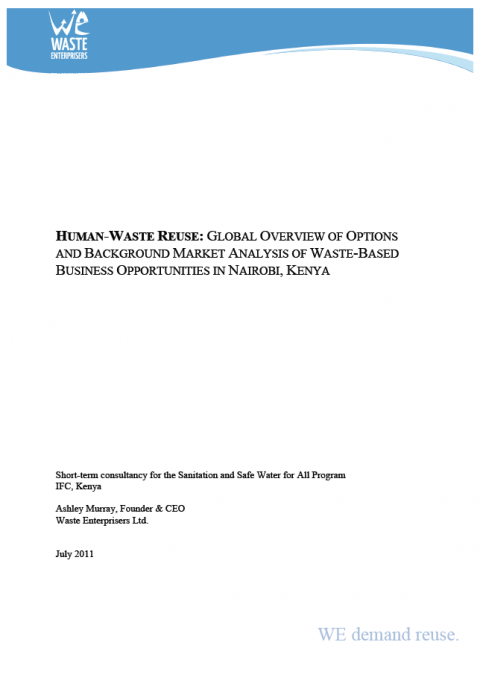Human-waste reuse: Global overview of options and background market analysis of waste-based business opportunities in Nairobi, Kenya
Murray, A. (2011)

Published in: 2011
Publisher:
Waste Enterprises Ltd.
Author:
Murray, A.
Uploaded by:
SuSanA secretariat
Partner profile:
common upload
5003 Views
98 Downloads
Location of library entry
Content - Summary
The Sanitation and Safe Water for All (SSAWA) program is an initiative recently launched by the IFC in Nairobi, Kenya. The program was established to identify and develop market vehicles for improving access to water and sanitation. To that end, this report looks at a novel mode of sanitation
entrepreneurship: the establishment of businesses that make productive and profitable use of wastewater and fecal sludge. That is, businesses that use human waste as a primary input into production for a variety of agricultural and energy products.
Recommendations and Conclusion:
Waste-based businesses that rely on human waste as a primary input into the production of e.g. food and
energy are a promising means of improving the function and reliability of urban sanitation value/service
chains. Whether these businesses are fully government run, are a hybrid public-private partnership (i.e.
management contract, BOT, concession) or are fully privatized, ultimately a portion of profits generated
by the business should be used to help finance weak links in the value chain. Various horizon
technologies such as biodiesel are enticing on a number of levels including potential profitability, volume
reduction and safety of effluent (by-product), low operation costs of facilities, and dual benefits for 5
sanitation and climate change mitigation agendas. The future of sanitation is no more the design and
construction of costly treatment and disposal facilities, but instead, the design and construction of
(money-making) production plants.
Bibliographic information
Murray, A. (2011). Human-waste reuse: Global overview of options and background market analysis of waste-based business opportunities in Nairobi, Kenya. Waste Enterprises Ltd.
Filter tags
English Faecal sludge treatment processes Sub-Saharan Africa Urban informal settlements (slums) Urine















